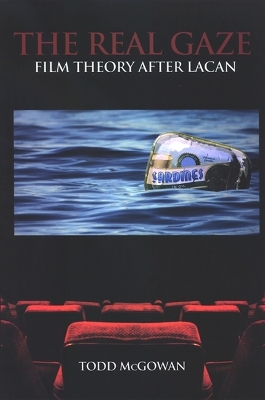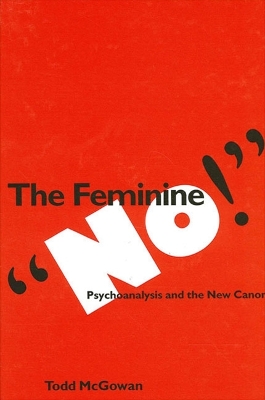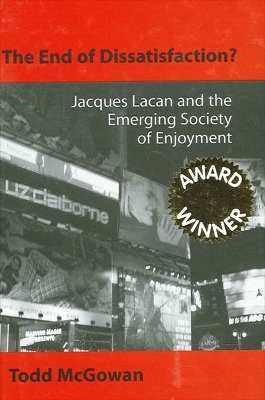SUNY series in Psychoanalysis and Culture
3 total works
Winner of the 2008 Gradiva Award, Theoretical Category, presented by the National Association for the Advancement of Psychoanalysis
The Real Gaze develops a new theory of the cinema by rethinking the concept of the gaze, which has long been central in film theory. Historically film scholars have located the gaze on the side of the spectator; however, Todd McGowan positions it within the filmic image, where it has the radical potential to disrupt the spectator's sense of identity and challenge the foundations of ideology. This book demonstrates several distinct cinematic forms that vary in terms of how the gaze functions within the films. Through a detailed investigation of directors such as Orson Welles, Claire Denis, Stanley Kubrick, Spike Lee, Federico Fellini, Ron Howard, Steven Spielberg, Andrei Tarkovsky, Wim Wenders, and David Lynch, McGowan explores the political, cultural, and existential ramifications of these differing roles of the gaze.
The Real Gaze develops a new theory of the cinema by rethinking the concept of the gaze, which has long been central in film theory. Historically film scholars have located the gaze on the side of the spectator; however, Todd McGowan positions it within the filmic image, where it has the radical potential to disrupt the spectator's sense of identity and challenge the foundations of ideology. This book demonstrates several distinct cinematic forms that vary in terms of how the gaze functions within the films. Through a detailed investigation of directors such as Orson Welles, Claire Denis, Stanley Kubrick, Spike Lee, Federico Fellini, Ron Howard, Steven Spielberg, Andrei Tarkovsky, Wim Wenders, and David Lynch, McGowan explores the political, cultural, and existential ramifications of these differing roles of the gaze.
The Feminine "No!" sheds new light on the recent culture wars and debates about changes to the literary canon. Todd McGowan argues that the dynamics of canon change, rather than being the isolated concern of literary critics, actually offer concrete insights into the source of social change. Through a deployment of psychoanalytic theory, McGowan conceives the rediscovery and subsequent canonization of previously forgotten literary works as recoveries of past traumas. As such, these rediscoveries call into question and disrupt not only the canon itself, but also the mechanisms of ideology, precisely because trauma is shown to be the key to radical social change. The book focuses on four of the most prominent rediscoveries in the canon of American literature: Charlotte Perkins Gilman's "The Yellow Wall-paper," Kate Chopin's The Awakening, Charles Chesnutt's The Marrow of Tradition, and Zora Neale Hurston's Their Eyes Were Watching God.
Winner of the 2004 Gary Olson Award for best book in cultural theory presented by JAC
Exploring the emergence of a societal imperative to enjoy ourselves, Todd McGowan builds on the work of such theorists as Jacques Lacan, Slavoj Zðizûek, Joan Copjec, and Theresa Brennan to argue that we are in the midst of a large-scale transformation—a shift from a society oriented around prohibition (i.e., the notion that one cannot just do as one pleases) to one oriented around enjoyment. McGowan identifies many of the social ills of American culture today as symptoms of this transformation: the sense of disconnection, the increase in aggression and violence, widespread cynicism, political apathy, incivility, and loss of meaning. Discussing these various symptoms, he examines various texts from film, literature, popular culture, and everyday life, including Toni Morrison's Paradise, Tony Kushner's Angels in America, and such films as Dead Poets Society and Trigger Effect. Paradoxically, The End of Dissatisfaction? shows how the American cultural obsession with enjoying ourselves actually makes it more difficult to do so.
Exploring the emergence of a societal imperative to enjoy ourselves, Todd McGowan builds on the work of such theorists as Jacques Lacan, Slavoj Zðizûek, Joan Copjec, and Theresa Brennan to argue that we are in the midst of a large-scale transformation—a shift from a society oriented around prohibition (i.e., the notion that one cannot just do as one pleases) to one oriented around enjoyment. McGowan identifies many of the social ills of American culture today as symptoms of this transformation: the sense of disconnection, the increase in aggression and violence, widespread cynicism, political apathy, incivility, and loss of meaning. Discussing these various symptoms, he examines various texts from film, literature, popular culture, and everyday life, including Toni Morrison's Paradise, Tony Kushner's Angels in America, and such films as Dead Poets Society and Trigger Effect. Paradoxically, The End of Dissatisfaction? shows how the American cultural obsession with enjoying ourselves actually makes it more difficult to do so.


